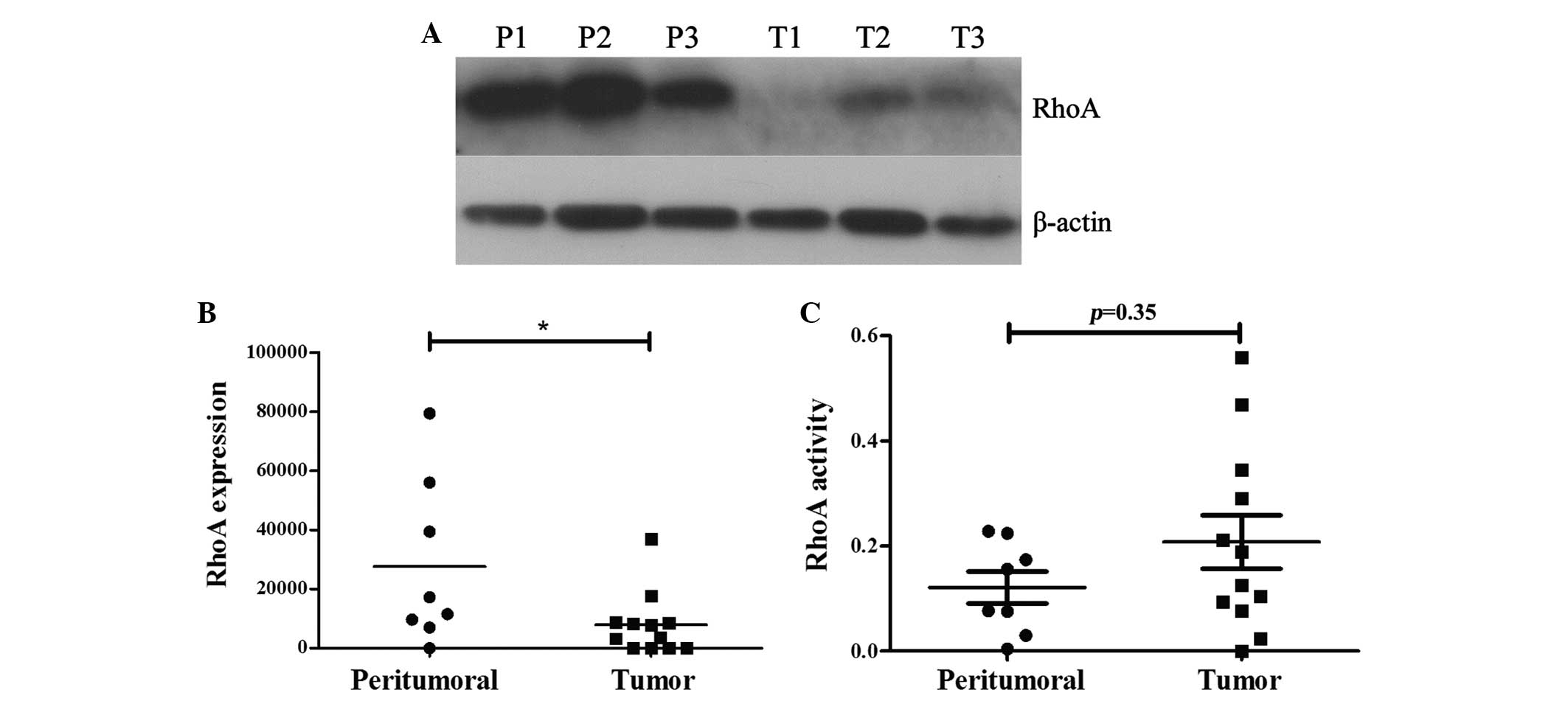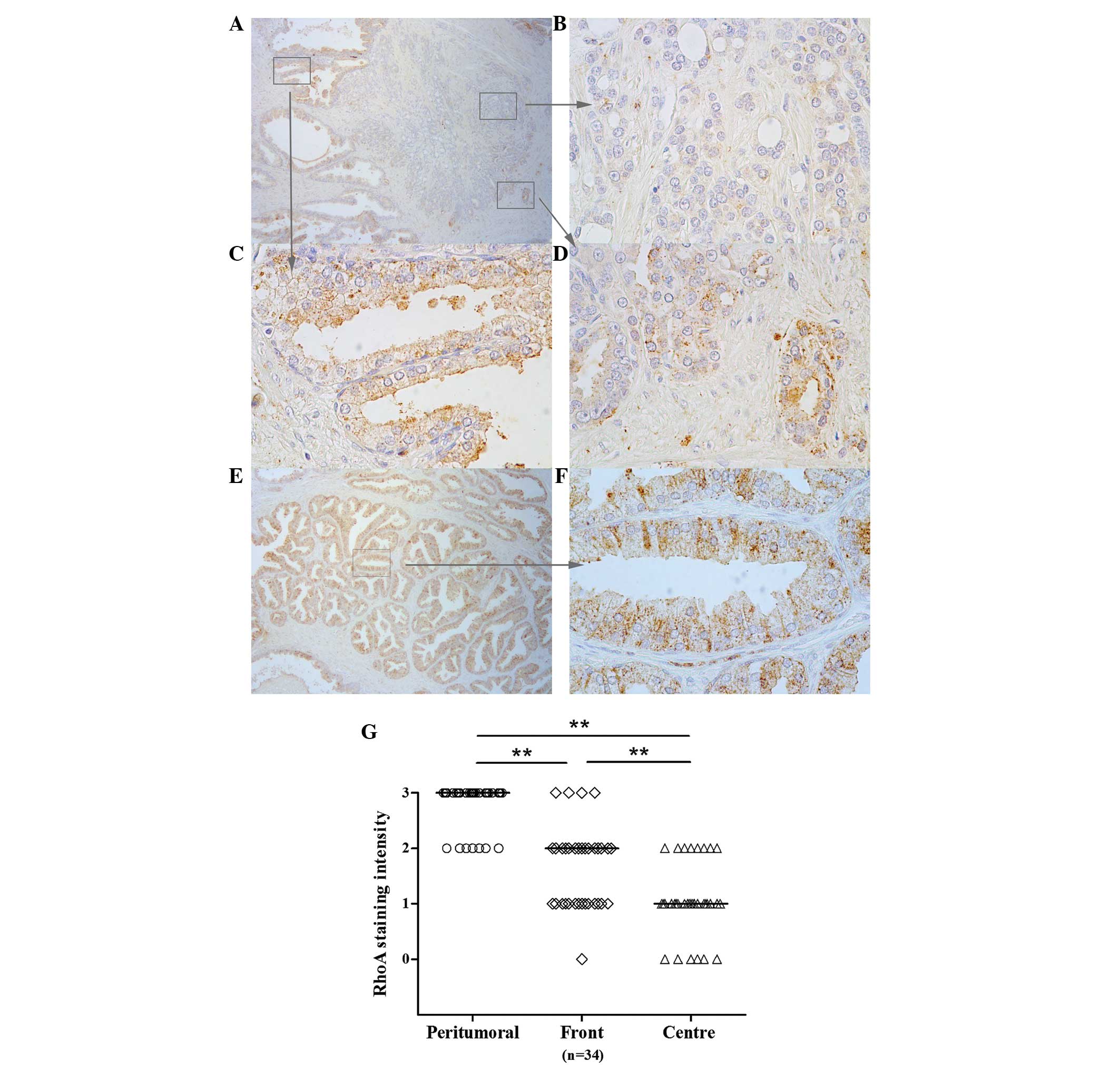|
1
|
Siegel R, Naishadham D and Jemal A: Cancer
statistics, 2013. CA Cancer J Clin. 63:11–30. 2013. View Article : Google Scholar : PubMed/NCBI
|
|
2
|
Haas GP, Delongchamps NB, Jones RF,
Chandan V, Serio AM, Vickers AJ, Jumbelic M, Threatte G, Korets R,
Lilja H and de la Roza G: Needle biopsies on autopsy prostates:
Sensitivity of cancer detection based on true prevalence. J Natl
Cancer Inst. 99:1484–1489. 2007. View Article : Google Scholar : PubMed/NCBI
|
|
3
|
Breslow N, Chan CW, Dhom G, Drury RA,
Franks LM, Gellei B, Lee YS, Lundberg S, Sparke B, Sternby NH and
Tulinius H: Latent carcinoma of prostate at autopsy in seven areas.
The International Agency for Research on Cancer, Lyons, France. Int
J Cancer. 20:680–688. 1977. View Article : Google Scholar : PubMed/NCBI
|
|
4
|
Thompson IM: Latent carcinoma of the
prostate. Eur Urol. 39(Suppl 4): S41–S42. 2001. View Article : Google Scholar
|
|
5
|
Stamey TA, Yemoto CM, McNeal JE, Sigal BM
and Johnstone IM: Prostate cancer is highly predictable: A
prognostic equation based on all morphological variables in radical
prostatectomy specimens. J Urol. 163:1155–1160. 2000. View Article : Google Scholar : PubMed/NCBI
|
|
6
|
Gulati R, Wever EM, Tsodikov A, Penson DF,
Inoue LY, Katcher J, Lee SY, Heijnsdijk EA, Draisma G, de Koning HJ
and Etzioni R: What if i don't treat my PSA-detected prostate
cancer? Answers from three natural history models. Cancer Epidemiol
Biomarkers Prev. 20:740–750. 2011. View Article : Google Scholar : PubMed/NCBI
|
|
7
|
Putzke AP, Ventura AP, Bailey AM, Akture
C, Opoku-Ansah J, Celiktaş M, Hwang MS, Darling DS, Coleman IM,
Nelson PS, et al: Metastatic progression of prostate cancer and
e-cadherin regulation by zeb1 and SRC family kinases. Am J Pathol.
179:400–410. 2011. View Article : Google Scholar : PubMed/NCBI
|
|
8
|
Tomita K, van Bokhoven A, van Leenders GJ,
Ruijter ET, Jansen CF, Bussemakers MJ and Schalken P: Cadherin
switching in human prostate cancer progression. Cancer Res.
60:3650–3654. 2000.PubMed/NCBI
|
|
9
|
Gotzmann J, Mikula M, Eger A,
Schulte-Hermann R, Foisner R, Beug H and Mikulits W: Molecular
aspects of epithelial cell plasticity: Implications for local tumor
invasion and metastasis. Mutat Res. 566:9–20. 2004. View Article : Google Scholar : PubMed/NCBI
|
|
10
|
Pertz O, Hodgson L, Klemke RL and Hahn KM:
Spatiotemporal dynamics of RhoA activity in migrating cells.
Nature. 440:1069–1072. 2006. View Article : Google Scholar : PubMed/NCBI
|
|
11
|
Machacek M, Hodgson L, Welch C, Elliott H,
Pertz O, Nalbant P, Abell A, Johnson GL, Hahn KM and Danuser G:
Coordination of Rho GTPase activities during cell protrusion.
Nature. 461:99–103. 2009. View Article : Google Scholar : PubMed/NCBI
|
|
12
|
Kurokawa K and Matsuda M: Localized RhoA
activation as a requirement for the induction of membrane ruffling.
Mol Biol Cell. 16:4294–4303. 2005. View Article : Google Scholar : PubMed/NCBI
|
|
13
|
Sakurai-Yageta M, Recchi C, Le Dez G,
Sibarita JB, Daviet L, Camonis J, D'Souza-Schorey C and Chavrier P:
The interaction of IQGAP1 with the exocyst complex is required for
tumor cell invasion downstream of Cdc42 and RhoA. J Cell Biol.
181:985–998. 2008. View Article : Google Scholar : PubMed/NCBI
|
|
14
|
Hotary K, Li XY, Allen E, Stevens SL and
Weiss SJ: A cancer cell metalloprotease triad regulates the
basement membrane transmigration program. Genes Dev. 20:2673–2686.
2006. View Article : Google Scholar : PubMed/NCBI
|
|
15
|
Berton S, Belletti B, Wolf K, Canzonieri
V, Lovat F, Vecchione A, Colombatti A, Friedl P and Baldassarre G:
The tumor suppressor functions of p27(kip1) include control of the
mesenchymal/amoeboid transition. Mol Cell Biol. 29:5031–5045. 2009.
View Article : Google Scholar : PubMed/NCBI
|
|
16
|
Horiuchi A, Imai T, Wang C, Ohira S, Feng
Y, Nikaido T and Konishi I: Up-regulation of small GTPases, RhoA
and RhoC, is associated with tumor progression in ovarian
carcinoma. Lab Invest. 83:861–870. 2003. View Article : Google Scholar : PubMed/NCBI
|
|
17
|
Modolo F, Biz MT, de Sousa SM, Fachinelli
Rde L and Crema VO: Immunohistochemical expression of Rho GTPases
in ameloblastomas. J Oral Pathol Med. 41:400–407. 2012. View Article : Google Scholar : PubMed/NCBI
|
|
18
|
Fritz G, Brachetti C, Bahlmann F, Schmidt
M and Kaina B: Rho GTPases in human breast tumours: Expression and
mutation analyses and correlation with clinical parameters. Br J
Cancer. 87:635–644. 2002. View Article : Google Scholar : PubMed/NCBI
|
|
19
|
Schmidt LJ, Duncan K, Yadav N, Regan KM,
Verone AR, Lohse CM, Pop EA, Attwood K, Wilding G, Mohler JL, et
al: RhoA as a mediator of clinically relevant androgen action in
prostate cancer cells. Mol Endocrinol. 26:716–735. 2012. View Article : Google Scholar : PubMed/NCBI
|
|
20
|
Epstein JI, Allsbrook WC Jr, Amin MB and
Egevad LL: ISUP Grading Committee: The 2005 International Society
of Urological Pathology (ISUP) Consensus Conference on Gleason
Grading of Prostatic Carcinoma. Am J Surg Pathol. 29:1228–1242.
2005. View Article : Google Scholar : PubMed/NCBI
|
|
21
|
Sobin LH, Gospodarowicz MK and Wittekind
C: Prostate. TNM Classification of Malignant Tumors (7th).
(Hoboken, NJ). 243–248. 2009.
|
|
22
|
Taylor CR and Levenson RM: Quantification
of immunohistochemistry - issues concerning methods, utility and
semiquantitative assessment II. Histopathology. 49:411–424. 2006.
View Article : Google Scholar : PubMed/NCBI
|
|
23
|
Hodge JC, Bub J, Kaul S, Kajdacsy-Balla A
and Lindholm PF: Requirement of RhoA activity for increased nuclear
factor kappaB activity and PC-3 human prostate cancer cell
invasion. Cancer Res. 63:1359–1364. 2003.PubMed/NCBI
|
|
24
|
Zheng R, Iwase A, Shen R, Goodman OB Jr,
Sugimoto N, Takuwa Y and Lerner DJ: Neuropeptide-stimulated cell
migration in prostate cancer cells is mediated by RhoA kinase
signaling and inhibited by neutral endopeptidase. Oncogene.
25:5942–5952. 2006. View Article : Google Scholar : PubMed/NCBI
|
|
25
|
Loberg RD, Tantivejkul K, Craig M, Neeley
CK and Pienta KJ: PAR1-mediated RhoA activation facilitates
CCL2-induced chemotaxis in PC-3 cells. J Cell Biochem.
101:1292–1300. 2007. View Article : Google Scholar : PubMed/NCBI
|
|
26
|
Chen X, Corbin JM, Tipton GJ, Yang LV,
Asch AS and Ruiz-Echevarría MJ: The TMEFF2 tumor suppressor
modulates integrin expression, RhoA activation and migration of
prostate cancer cells. Biochim Biophys Acta. 1843:1216–1224. 2014.
View Article : Google Scholar : PubMed/NCBI
|
|
27
|
Yamamura S, Saini S, Majid S, Hirata H,
Ueno K, Deng G and Dahiya R: MicroRNA-34a modulates c-Myc
transcriptional complexes to suppress malignancy in human prostate
cancer cells. PLoS One. 7:e297222012. View Article : Google Scholar : PubMed/NCBI
|
|
28
|
Grandoch M, Rose A, ter Braak M,
Jendrossek V, Rübben H, Fischer JW, Schmidt M and Weber P: Epac
inhibits migration and proliferation of human prostate carcinoma
cells. Br J Cancer. 101:2038–2042. 2009. View Article : Google Scholar : PubMed/NCBI
|
|
29
|
Zhou C, Ling MT, Lee Kin-Wah T, Man K,
Wang X and Wong YC: FTY720, a fungus metabolite, inhibits invasion
ability of androgen-independent prostate cancer cells through
inactivation of RhoA-GTPase. Cancer Lett. 233:36–47. 2006.
View Article : Google Scholar : PubMed/NCBI
|
|
30
|
Nithipatikom K, Gomez-Granados AD, Tang
AT, Pfeiffer AW, Williams CL and Campbell WB: Cannabinoid receptor
type 1 (CB1) activation inhibits small GTPase RhoA activity and
regulates motility of prostate carcinoma cells. Endocrinology.
153:29–41. 2012. View Article : Google Scholar : PubMed/NCBI
|
|
31
|
Joyce JA: Therapeutic targeting of the
tumor microenvironment. Cancer Cell. 7:513–520. 2005. View Article : Google Scholar : PubMed/NCBI
|
|
32
|
Cianchi F, Cuzzocrea S, Vinci MC,
Messerini L, Comin CE, Navarra G, Perigli G, Centorrino T, Marzocco
S, Lenzi E, et al: Heterogeneous expression of cyclooxygenase-2 and
inducible nitric oxide synthase within colorectal tumors:
Correlation with tumor angiogenesis. Dig Liver Dis. 42:20–27. 2010.
View Article : Google Scholar : PubMed/NCBI
|
|
33
|
Delongchamps NB, Beuvon F, Mathieu JR,
Delmas S, Metzger I, Prats H and Cabon F: CXCR4 is highly expressed
at the tumor front but not in the center of prostate cancers. World
J Urol. 33:281–287. 2015. View Article : Google Scholar : PubMed/NCBI
|
|
34
|
Gasman S, Chasserot-Golaz S, Hubert P,
Aunis D and Bader MF: Identification of a potential effector
pathway for the trimeric Go protein associated with secretory
granules. Go stimulates a granule-bound phosphatidylinositol
4-kinase by activating RhoA in chromaffin cells. J Biol Chem.
273:16913–16920. 1998. View Article : Google Scholar : PubMed/NCBI
|
|
35
|
Frantz C, Coppola T and Regazzi R:
Involvement of Rho GTPases and their effectors in the secretory
process of PC12 cells. Exp Cell Res. 273:119–126. 2002. View Article : Google Scholar : PubMed/NCBI
|

















